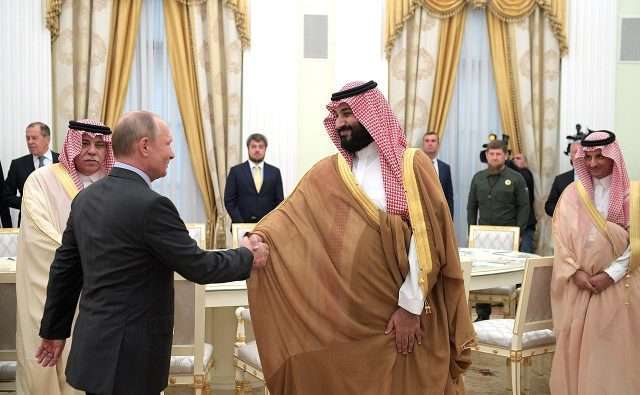Russia and Saudi Arabia discussed the situation in the global oil market

Author: Silvia Boltuc
The recent phone conversation between the President of Russia and the Crown Prince of Saudi Arabia might be interpreted as the Kremlin’s move to counter the recent U.S. President Joe Biden’s official visit to Riyadh. It might suggest that the geopolitical balances in the Middle East and the Gulf Arab monarchies might shift from the West to the East (first among all, Russia and China).
The President of the Russian Federation, Vladimir Putin, had a telephone conversation with the Crown Prince of Saudi Arabia, Mohammed bin Salman Al Saud (MBS), to discuss issues related to the oil market and geopolitics in the Middle East. According to Russian official sources, the parties emphasised the importance of further coordination within the framework of OPEC+. Furthermore, Putin and MBS showed satisfaction that the countries participating in this format consistently fulfilled their obligations to maintain the necessary balance and stability in the global energy market.[1]
In addition, the parties discussed the current situation in Syria and topical issues of bilateral cooperation with a focus on expanding mutually beneficial trade and economic ties. In general, the President of the Russian Federation and the Crown Prince positively assessed the current level of friendly relations between Russia and Saudi Arabia.
Geopolitical scenario
On July 15th, 2022, U.S. President Joe Biden visited Saudi Arabia and met with Crown Prince Mohammed bin Salman Al Saud. The U.S. media negatively assessed the results of this trip, mainly because the meeting between Biden and Mohammed bin Salman did not resolve the complicated relations and situation between the parties originated by U.S. President’s statements on the human rights situation in Saudi Arabia and the military campaign in Yemen.[2]
Mohammed bin Salman refused Biden’s request to increase Saudi Arabia’s oil output to reduce global supply pressures. Moreover, during the U.S.-Arab summit OPEC+, oil cartel nations reiterated that they would continue to assess market conditions.
The Ukraine conflict and the following U.S. and European Union sanctions against the Russian Federation have influenced the global oil market. Indeed, the sanctions imposed on Moscow’s energy supplies have caused oil prices to rise and an urgent need for new gas suppliers for Europe and created opportunities for Persian Gulf countries. Skyrocketing oil prices favour exporting countries in the Middle East, which have gained significant geopolitical leverage vis-à-vis the West.[3]
Saudi Arabia is a member of OPEC+ with Russia, Iran, and Venezuela, countries Washington considers hostile and threats to its national security and foreign policy. Since the Ukraine conflict and the U.S. troops’ reduction in Iraq, the situation in the Middle East has changed in favour of Washington’s enemies as Russia and Iran.
Risk assessment
The United States cannot lose Saudi support in the Middle East and local Arab-Muslim world dynamics. Joe Biden’s harsh criticism against Mohammed bin Salman, the condition of human rights in Saudi Arabia, and the conflict in Yemen have frozen Washington-Riyadh relations and opened the Saudi Kingdom to different diplomat partners such as the Russian Federation and China.
Furthermore, since the beginning of the Ukraine conflict and the consequent energy and economic crisis caused by Western sanctions, the United States need that Saudi Arabia and other Gulf Arab monarchies will be aligned in supporting the European Union in its quest for energy diversification.
Since Saudi Arabia, Iran, Venezuela, and Russia are members of OPEC+ and their economies significantly rely on oil and gas revenues, close cooperation between these countries might present a threat to the U.S. leadership and could reduce some of the effects of the sanctions.
Sources
[1] NTV (2022) Путин обсудил ситуацию на нефтяном рынке с принцем Саудовской Аравии. Link: https://www.ntv.ru/novosti/2715950/
[2] Middle East Eye (2022) Biden receives muted reception in Saudi Arabia. This is how previous US presidents were greeted. Link: https://www.middleeasteye.net/news/biden-received-saudi-arabia-governor-mecca-sign-strained-ties#:~:text=The%20two%2Dterm%2C%20former%20US,of%20the%202008%20financial%20crisis.; Kate Sullivan (2022) 5 takeaways from Biden’s first presidential trip to the Middle East, CNN. Link: https://edition.cnn.com/2022/07/16/politics/biden-middle-east-trip-takeaways/index.html
[3] Silvia Boltuc (2022) Geopolitical scenarios of the Persian Gulf in the aftermath of the Ukrainian crisis, Geopolitical Report Volume 17 Issue 6, SpecialEurasia. Link: https://www.specialeurasia.com/2022/03/21/persian-gulf-geopolitics/
Author: Silvia Boltuc. Request the full SpecialEurasia report and analysis on Russia-Saudi Arabia relations and their impact on Eurasia by contacting us at the following LINK.
